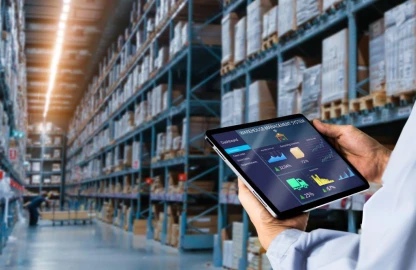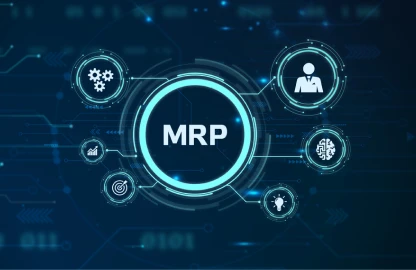ERP for solar industry: Optimizing solar panel manufacturing process
Solar panel production has changed rapidly in the industry, and it has met as many developments as needed to fulfill the demands of customers who want to use energy sustainably. It is estimated that India has around 52 million homes with solar energy potential about 10% of its urban independent households adopting solar systems. This indicates a significant potential for renewable energy in the county.
That is the next level of growth, and so there comes the challenge of these processes staying quality, in line with regulatory requirements, and, much needed, realizing operational efficiency. ERP for Solar Industry holds the answers so that it can integrate real-time visibility with automation in effective ways across the entire manufacturing process.
This blog covers the most critical issues in solar panel production and how our Lighthouse ERP solution could help companies succeed in such a competitive environment.

How Solar Energy is Generated?
Solar panels are the first step in the process of producing solar energy. Photovoltaic cells then transform the sunlight into electrical power. These cells produce direct current (DC) power by using semiconductor materials. Solar inverters then transform this DC into alternating current (AC), which is appropriate for usage in homes, businesses, and industries. The efficiency of silicon wafer slicing and cell assembly has increased due to technological developments in solar cell manufacturing. These developments have improved energy capture and communication even more.
Overview of Solar Panel Design, Material Selection, and Manufacturing Process
The production of solar panels goes through many important steps, all of which are necessary to guarantee effectiveness, sustainability, and quality. Every phase, from acquiring materials to final assembly, is essential to guaranteeing the panels operate effectively for the duration of their life. To satisfy market demands and regulatory requirements, careful consideration of design, material selection, and process optimization is essential.
Why is ERP Critical for Solar Panel Manufacturing?
- Smart Compliance for Solar Manufacturing with Lighthouse ERP
- Key Design Principles for Solar Panels
- Material Selection for Solar Panels
- Key steps in Solar Panel Manufacturing
- Solar panel production includes:
- Wafer slicing, doping, anti-reflective coating, and metallization are all steps in the solar cell manufacturing process.
- Panel assembly consists of stringing and tabbing, followed by EVA, glass, and back sheet, aluminium framing, junction box installation with bypass diodes, and airtight sealing
- Panels are tested using electroluminescence imaging and IV curve analysis to ensure their performance and reliability.
The government's requirement for an approved list of solar photovoltaic module producers is one of the robust regulatory frameworks supporting India's drive for renewable energy. The Government of India had recently mandated a list of Approved Models and Manufacturers of Solar Photovoltaic Modules. Only companies compliant with this list are eligible to work on government-backed solar projects. This regulation guarantees that government-supported projects only use premium solar cells and modules. Lighthouse ERP is the best erp software in India which ensures a smooth integration of compliance into the manufacturing workflow by automating operations such as panel ID tracking, quality assurance, and regulatory reporting, enabling manufacturers to meet this mandate.
The main goal of solar panel design is to combine efficiency, cost, and market demands by choosing the best solar cells (monocrystalline, polycrystalline, or thin film). Optimizing module size, connectivity, and cell arrangement guarantees optimal energy output with the least amount of material waste. For a lifespan of more than 25 years, durability is essential, requiring resistance to weather elements such as UV radiation, rain, wind, hail, and thermal cycling
Performance and durability are improved by the effective selection of materials. The best performance and long-term dependability are guaranteed by high-efficiency solar cells, lightweight aluminum frames, UV and moisture-resistant back sheet materials, low-iron tempered glass for light transmission, EVA encapsulation for insulation, and silver paste for connections.
Manufacturing Procedures for Solar Panel with Lighthouse ERP
The implementation of solar ERP in manufacturing solar panels improves efficiency at all stages, from production orders to finished products. Processes are automated and well-coordinated to ensure efficient resource utilization and consistent quality. Lighthouse Solar ERP provides real-time data to track progress, make better decisions, and ensure traceability throughout production.

- Production Planning and Order Management
- Tracking and Identification with UID/Barcodes
- Material and Inventory Management
- Production Process Coordination
- Quality Control Integration
- Lamination, framing, and junction Box Assembly
- Packaging and Finished Goods Management
- Warehouse and Stock Management
Solar ERP systems generate and manage production orders, and specify material requirements, production timelines, and resource allocation. Solar ERP meets production deadlines and maximizes resource utilization by efficient scheduling.
ERP generates UID or barcodes for each solar panel, allowing for precise tracking and quality control. These UID/barcodes are linked to job cards, allowing for real-time tracking of progress and status throughout the production process.
ERP for inventory management tracks and manages raw material inventories such as solar cells, glass sheets, and frames. It ensures enough stock for each stage, such as cell cutting, stringing, and assembly, while minimizing material waste.
The process starts with the cell cutting, where the system tracks material usage and production efficiency. Stringing and glass loading comes next, during which the Production module in ERP ensures that the correct components are chosen and supervises the assembly of solar cells on glass sheets. Following that, in the auto-bussing and layup stage, the system automates busbar placement and supervises panel layering, ensuring precise and accurate assembly.
Lighthouse ERP ensures quality at all stages, from visual testing to inspection logs and repair scheduling. The 90° flip inspection checks structural electrical integrity, and final quality control consolidates all results to ensure that the product meets specifications.
Lighthouse Solar ERP monitors and coordinates sandwiching and lamination processes to ensure material availability and proper execution. It manages the framing process and keeps track of junction box installation to maintain production accuracy.
Solar ERP manages packing supplies, keeps track of when panels are ready for shipping, and manages the packing process. Completed panels are entered into the system, and transfer notes are produced to update inventory and make warehouse storage and retrieval more effective.
ERP tracks the stock levels of finished solar panels in the warehouse, ensuring efficient storage and retrieval. It simplifies inventory control and offers precise stock updates for smooth delivery.
ERP Features and Modules for Solar Panel Manufacturing
Specialized modules designed for solar panel manufacturing are offered by Lighthouse ERP:
- Raw Material Procurement
- Production Planning and Resource Optimization
- Unique panel ID Assignment and Stage-Wise Tracking
- Inventory Management
- Quality Assurance and Rectification
- Automation-Driven Efficiency
- Real-Time Reporting and Financial Management
To guarantee a consistent supply for continuous production, raw material procurement automates the sourcing and tracking of necessary materials such as silicon, glass, and solar cells.
Aligns manufacturing schedules with demand forecast, optimizing resource utilization and minimizing delays.
Assigns UIDs to each panel and tracks real-time progress through every production stage, capturing detailed data on equipment usage, material consumption, and operational efficiency.
To minimize waste, avoid shortages or overstocking, and enhance inventory turnover, inventory management skillfully keeps an eye on stock levels.
Ensures compliance with quality standards, eliminates duplicate barcodes, efficiently manages rejected panels, and facilitates seamless rectifications without disrupting production.
Automates critical processes to enhance operational efficiency, minimize human error, and accelerate workflows.
Provides actionable insights through detailed real-time reports while enabling budget tracking, expense monitoring, and informed financial decisions for sustainable growth.
Conclusion
The production of solar panels is converting because of improvements in automation, regulations, production techniques, and material choices. Manufacturing manner optimization includes resolving numerous complicated issues, and Lighthouse ERP will help producers accomplish a sustainable power destiny. As a result, it's going to offer solar panel manufacturers operational excellence, the capacity to quickly reply to new wishes of their enterprise, and a position inside the destiny of renewable power.









